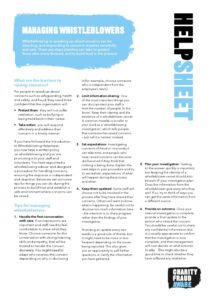Whistleblowing or speaking up about concerns can be daunting, and responding to concerns requires sensitivity and care. There are steps charities can take to protect those who come forward, and to build trust in the process.
What are the barriers to raising concerns?
For people to speak up about concerns such as safeguarding, health and safety, and fraud, they need to be confident that the organisation will:
- Protect them: they will not suffer retaliation, such as bullying or being held back in their career.
- Take action: you will respond effectively and address their concern in a timely manner.
If you have followed the Introduction to Whistleblowing Helpsheet, you now have a written policy on whistleblowing and you are promoting it to your staff and volunteers. You have appointed a whistleblowing adviser and designed a procedure for handling concerns, ensuring the response is independent and objective. Below we set out some tips for things you can do during the process to build trust and establish a safe environment where concerns can be raised.
Tips for managing whistleblowers
- Handle the first conversation with care: First impressions are important and staff need to feel comfortable to share what they know. Choose someone for this conversation with strong listening skills and empathy, that will be trusted to handle the concern discretely. You might need to adapt who receives the concern depending on who is disclosing it (for example, choose someone who is independent from the employee’s team).
- Limit information-sharing: One of the most important things you can do to protect your staff is limit the number of people ‘in the know’. Keep their identity and the existence of a whistleblower secret. A common mistake is to refer to your work as a ‘whistleblowing investigation’, which tells people that someone has raised concerns – just call it a ‘review’ instead.
- Set expectations: Investigating concerns of fraud or misconduct can take time, and people who have raised concerns can become disillusioned if they think that nothing is being done. Explain the next steps in your procedure and try to set realistic expectations of what will happen during the process and when.
- Keep them updated: Some staff will choose not to be involved in the process after they have shared their concerns. Others will want to know what is happening. Be careful not to disclose too much information here – the intention is to share progress rather than the findings of your investigation.
Providing an update every two weeks is a good rule of thumb, but it might need to be more or less frequent depending on the issues being reported. This also gives you an opportunity to ask further questions or clarify the information you have gathered. - Plan your investigation: Getting to the answer quickly is important, but keeping the identity of a whistleblower secret should also be part of your investigation plan. Does the information from the whistleblower give away who they are? If so, try to think of ways you can get the same information from a different source.
- Provide an outcome: Once your internal investigation is complete, provide a final update to the person who raised the concern. You should be careful not to share any confidential information, but it is usually appropriate to confirm that the investigation is now complete, and that management will now decide on what action(s) to take. This might also be a good time to check whether they have suffered any retaliation.
OTHER RESOURCES
Preventing Charity Fraud contains resources to help charities prevent, detect and respond to fraud, including the Helpsheet ‘Introduction to Whistleblowing’.
The Charity Commission for England and Wales has produced guidance on how to ‘Report serious wrongdoing at a charity as a worker or volunteer’.
The Scottish Charity Regulator has produced guidance on ‘Whistleblowing to OSCR’.
The Charity Commission for Northern Ireland has produced a range of resources covering this area. See ‘Concerns about charities guidance’, ‘Whistleblowing in charities: a thematic report from the Charity Commission for Northern Ireland’, and ‘Serious incident reporting: a guide for charity trustees’.
Protect is a charity providing free and confidential advice to anyone who has witnessed wrongdoing in their workplace but is unsure how to raise their concerns.
ACKNOWLEDGEMENT
This helpsheet was kindly prepared by Grant Thornton.
DISCLAIMER
Published 2023.
© Fraud Advisory Panel, Charity Commission for England and Wales and 2023. Fraud Advisory Panel and Charity Commission for England and Wales and Grant Thornton UK LLP will not be liable for any reliance you place on the information in this material. You should seek independent advice.
This work is licensed under a Creative Commons Attribution-NonCommercial-NoDerivatives 4.0 International License.
